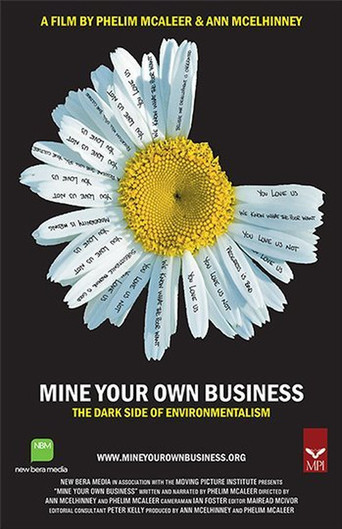TheBlueHairedLawyer
In Sydney Mines Nova Scotia, when the large coal mines and steel mill were here everything was better, families could survive and afford to live there. Thanks to environmental organizations the mines were closed, the steel mill soon after, and Cape Breton Island suffered a huge economic collapse leaving families forced to move out west for new work.This isn't the first example of uneducated environmentalists fighting for a cause that isn't even there; these hippies have gotten many places shut down or threatened careers, from the anti-fracking activists to the protesters of the Dow Chemical Company. In the end these corporations are the good guys; they provide useful products and jobs to thousands of employees per corporation.Mine Your Own Business deserves a much higher rating, watch it with an open mind. It presents facts and interviews the locals in these small towns that rely on mining as the main industry. It also exposes these environmentalists as uneducated people who are narrow-minded and won't accept that there are two sides to every story. It isn't biased, it shows facts before opinions and explores the second side. I loved it, check it out!
rfscala
My husband and I watched this film and were startled to find that, although the subjects were in various countries and nowhere near us, we felt it was a tale of our current plight. Change the location and the industry and it is HERE.What an excellent film. Finally, local people speaking for themselves rather than outsiders declaring what is correct or allowable for the locals.What is the definition of poverty? This film shows the real definition and the reason why poverty is still so rampant, even in the United States.This should be required viewing in all schools. Instead of the "green" movement propaganda that is overtaking our children and brainwashing them into believing an ecological fairytale, reality should be given at least equal time. This film is that reality.
magicalangelicus
This movie gets to the heart of the "other side" of the story. While most well-to-do westerners oppose mining on altruistic and environmental grounds, they ignore what happens to the people whose livelihoods depend on mines. From Eastern Europe to South America, we travel from mine to mine to get the perspectives of the mine workers, the communities that depend on them, as well as perspectives from environmentalists. What makes this movie so effective is how it juxtaposes the claims of self-absorbed Western environmentalists with what actually goes on in poor mining communities.It's not the usual feel-good pap you'll see from Hollywood. This movie will challenge the western viewer's assumptions about the impacts of "feel good" environmentalism. When DDT was banned in Africa to satisfy Western environmentalist desires, millions of Africans died. Now the cycle seems to be repeating, only this time Westerners are killing off a way of living for many of the world's poorest.
odo5435
It is good to see that large mining companies have mainly philanthropic goals as depicted in this documentary. In all three examples we are given it is obvious that the existing population will benefit from the proposed mining operations and that they are very keen for operations to start. It makes one feel good to see the landscape repairs that are GOING to happen in the little Romanian town that was raped by old Soviet mining methods.The self interests of the opposing environmental lobbyists was a refreshing angle and the downright patronising attitude of the South African environmentalist in Madagascar needed to be exposed.The whole picture, however, seems to me a little unbalanced. The only examples reported in the documentary showed what the mining companies are GOING to do. There was NOT ONE example of an EXISTING mining operation in a third world country to show how well they have achieved their stated aims in the past (perhaps because they couldn't find any).The whole story would have benefited if there had been at least one example where we were shown the real benefits that have accrued from existing mining operations. How many local jobs have been created in mines in, say, Ghana or Indonesia versus how many workers are flown in from other countries? We also should have been shown how mines in these area have added to local environments. What wetlands etc. have been created? Some footage of the beautified landscapes that have been created by existing operations would also have been useful. I suspect they were not shown because they would not have painted a very flattering pictureThis documentary very well produced but I feel that we are only being told half of the story. The effects of mining in third world countries are somewhat more intrusive than the rosy picture painted here.


 AD
AD
